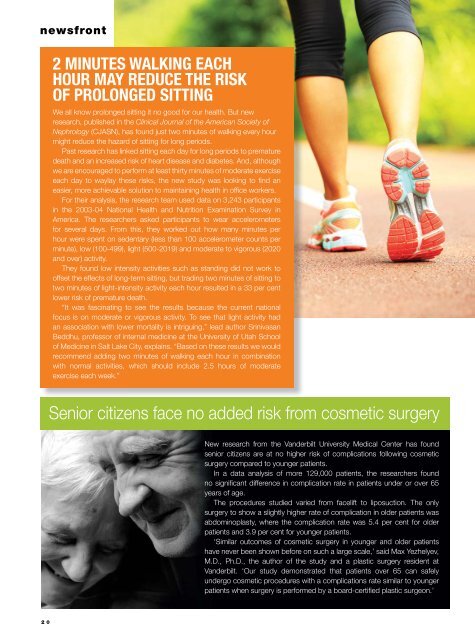Cosmetic Surgery and Beauty Magazine #68
Create successful ePaper yourself
Turn your PDF publications into a flip-book with our unique Google optimized e-Paper software.
newsfront<br />
2 MINUTES WALKING EACH<br />
HOUR MAY REDUCE THE RISK<br />
OF PROLONGED SITTING<br />
We all know prolonged sitting it no good for our health. But new<br />
research, published in the Clinical Journal of the American Society of<br />
Nephrology (CJASN), has found just two minutes of walking every hour<br />
might reduce the hazard of sitting for long periods.<br />
Past research has linked sitting each day for long periods to premature<br />
death <strong>and</strong> an increased risk of heart disease <strong>and</strong> diabetes. And, although<br />
we are encouraged to perform at least thirty minutes of moderate exercise<br />
each day to waylay these risks, the new study was looking to fi nd an<br />
easier, more achievable solution to maintaining health in offi ce workers.<br />
For their analysis, the research team used data on 3,243 participants<br />
in the 2003-04 National Health <strong>and</strong> Nutrition Examination Survey in<br />
America. The researchers asked participants to wear accelerometers<br />
for several days. From this, they worked out how many minutes per<br />
hour were spent on sedentary (less than 100 accelerometer counts per<br />
minute), low (100-499), light (500-2019) <strong>and</strong> moderate to vigorous (2020<br />
<strong>and</strong> over) activity.<br />
They found low intensity activities such as st<strong>and</strong>ing did not work to<br />
offset the effects of long-term sitting, but trading two minutes of sitting to<br />
two minutes of light-intensity activity each hour resulted in a 33 per cent<br />
lower risk of premature death.<br />
“It was fascinating to see the results because the current national<br />
focus is on moderate or vigorous activity. To see that light activity had<br />
an association with lower mortality is intriguing,” lead author Srinivasan<br />
Beddhu, professor of internal medicine at the University of Utah School<br />
of Medicine in Salt Lake City, explains. “Based on these results we would<br />
recommend adding two minutes of walking each hour in combination<br />
with normal activities, which should include 2.5 hours of moderate<br />
exercise each week.”<br />
Senior citizens face no added risk from cosmetic surgery<br />
New research from the V<strong>and</strong>erbilt University Medical Center has found<br />
senior citizens are at no higher risk of complications following cosmetic<br />
surgery compared to younger patients.<br />
In a data analysis of more 129,000 patients, the researchers found<br />
no signifi cant difference in complication rate in patients under or over 65<br />
years of age.<br />
The procedures studied varied from facelift to liposuction. The only<br />
surgery to show a slightly higher rate of complication in older patients was<br />
abdominoplasty, where the complication rate was 5.4 per cent for older<br />
patients <strong>and</strong> 3.9 per cent for younger patients.<br />
‘Similar outcomes of cosmetic surgery in younger <strong>and</strong> older patients<br />
have never been shown before on such a large scale,’ said Max Yezhelyev,<br />
M.D., Ph.D., the author of the study <strong>and</strong> a plastic surgery resident at<br />
V<strong>and</strong>erbilt. ‘Our study demonstrated that patients over 65 can safely<br />
undergo cosmetic procedures with a complications rate similar to younger<br />
patients when surgery is performed by a board-certifi ed plastic surgeon.’<br />
20


















